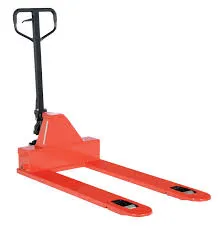


Understanding Industrial Pallet Trucks A Comprehensive Overview
In the modern industrial landscape, efficiency and productivity are paramount. One of the essential tools that contribute to achieving these goals is the industrial pallet truck. This device, also known as a pallet jack or pump truck, has become a staple in warehouses, manufacturing facilities, and distribution centers. This article will delve into the various aspects of industrial pallet trucks, including their types, features, applications, and advantages.
Types of Industrial Pallet Trucks
Industrial pallet trucks come in various forms, each designed to meet specific operational needs. The most common types include
1. Manual Pallet Trucks These hand-operated devices are the most basic type of pallet truck. They require the operator to manually pump the handle to lift the pallet off the ground. Manual pallet trucks are ideal for low-to-moderate volume operations, where portability and simplicity are key.
2. Electric Pallet Trucks Also known as powered pallet trucks, these come with an electric motor that assists with lifting and maneuvering loads. They can be operated via a handle or a remote control, making them suitable for heavy loads and long distances. Electric pallet trucks are often used in larger warehouses and distribution centers where efficiency is critical.
3. High Lift Pallet Trucks These specialized pallet trucks can elevate loads significantly higher than standard models, allowing for temporary stacking or accessing higher shelving systems. They are invaluable in settings where space optimization is necessary.
4. Stainless Steel Pallet Trucks Designed primarily for environments that require high sanitary standards, such as food processing or pharmaceuticals, these trucks are made of stainless steel for easy cleaning and corrosion resistance.
Key Features
When selecting an industrial pallet truck, various features should be considered
- Load Capacity The maximum weight the pallet truck can handle varies by type. Manual models can typically carry around 2,500 kg, while electric models may support up to 3,500 kg or more.
- Fork Length and Width Standard fork lengths range from 1150 mm to 2000 mm. Fork width is also variable, affecting maneuverability in narrow aisles.
- Turning Radius A smaller turning radius allows for better maneuverability, particularly in tight spaces.
- Ergonomics Features such as cushioned handles, adjustable heights, and better wheel designs enhance user comfort and safety.

- Safety Features Many models come equipped with safety features such as automatic brakes and anti-collision systems for the prevention of accidents.
Applications
Industrial pallet trucks are versatile tools, utilized across various sectors
- Warehousing and Distribution They facilitate the movement of goods and materials, making stock handling more efficient
.- Manufacturing In factories, pallet trucks help transport raw materials and finished products between production lines and storage areas.
- Retail Retail spaces often use pallet trucks to manage inventory both on the sales floor and in backrooms.
- Food and Beverage In food processing, the hygienic design of stainless steel pallet trucks is particularly valuable for regulatory compliance.
Advantages of Using Industrial Pallet Trucks
The incorporation of industrial pallet trucks into logistics and warehouse operations offers numerous advantages
1. Increased Efficiency They enable quicker and easier movement of goods, reducing the time spent on loading and unloading.
2. Reduced Labor Strain Electric models often require less physical exertion from operators, minimizing the risk of injury and fatigue.
3. Versatility With various types available, businesses can select a model suited to their specific operational needs.
4. Cost-Effective Compared to forklifts, pallet trucks are generally more affordable and require less maintenance.
In conclusion, industrial pallet trucks play a crucial role in enhancing operational efficiency and safety in various sectors. Understanding the different types and features helps businesses choose the right equipment to meet their needs, ultimately leading to optimized productivity and reduced operational costs. As industries continue to evolve, the importance of reliable material handling solutions like pallet trucks will only grow.



